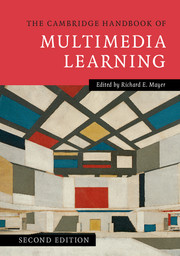Book contents
- The Cambridge Handbook of Multimedia Learning
- The Cambridge Handbook of Multimedia Learning
- Copyright page
- Contents
- Contributors
- Preface
- Acknowledgments
- 1 Introduction to Multimedia Learning
- Part I Theoretical Foundations
- Part II Basic Principles of Multimedia Learning
- Part III Advanced Principles of Multimedia Learning
- Part IV Multimedia Learning of Cognitive Processes
- Part V Multimedia Learning in Advanced Computer-Based Contexts
- 29 Multimedia Learning with Intelligent Tutoring Systems
- 30 Multimedia Learning with Simulations and Microworlds
- 31 Multimedia Learning with Computer Games
- 32 Multimedia Learning with Video
- 33 Multimedia Learning from Multiple Documents
- 34 Multimedia Learning in e-Courses
- Author Index
- Subject Index
34 - Multimedia Learning in e-Courses
from Part V - Multimedia Learning in Advanced Computer-Based Contexts
Published online by Cambridge University Press: 05 August 2014
- The Cambridge Handbook of Multimedia Learning
- The Cambridge Handbook of Multimedia Learning
- Copyright page
- Contents
- Contributors
- Preface
- Acknowledgments
- 1 Introduction to Multimedia Learning
- Part I Theoretical Foundations
- Part II Basic Principles of Multimedia Learning
- Part III Advanced Principles of Multimedia Learning
- Part IV Multimedia Learning of Cognitive Processes
- Part V Multimedia Learning in Advanced Computer-Based Contexts
- 29 Multimedia Learning with Intelligent Tutoring Systems
- 30 Multimedia Learning with Simulations and Microworlds
- 31 Multimedia Learning with Computer Games
- 32 Multimedia Learning with Video
- 33 Multimedia Learning from Multiple Documents
- 34 Multimedia Learning in e-Courses
- Author Index
- Subject Index
Summary
e-Learning in synchronous and asynchronous formats continues to come to the fore as a delivery medium in workforce learning as well as in the academic sector. This chapter reviews research on e-learning conducted over the past 25 years grouped into four themes that characterize the major research goals: (1) media comparison research with experiments that ask whether some delivery media are more effective for learning than other delivery media; (2) value-added research with experiments on lessons or instructional approaches such as games in which a specific instructional technique (such as self-explanation prompts) is added to one version but not to a second version in order to identify techniques that add to or detract from learning; (3) interaction research with experiments in which the effects of an experimental treatment such as graphics are compared in different learner populations or with different learning content; and (4) unique affordances research that focuses on the instructional effectiveness of features of digital media such as online games and pedagogical agents that cannot readily be provided in nondigital media.
Research on multimedia learning reported since the first edition of the Cambridge Handbook of Multimedia Learning has advanced our knowledge by confirming some earlier conclusions, adding boundary conditions to previous guidelines such as the modality principle, and advancing new knowledge regarding technological affordances such as games and online collaboration.
Keywords
Information
- Type
- Chapter
- Information
- The Cambridge Handbook of Multimedia Learning , pp. 842 - 882Publisher: Cambridge University PressPrint publication year: 2014
Accessibility standard: Unknown
Why this information is here
This section outlines the accessibility features of this content - including support for screen readers, full keyboard navigation and high-contrast display options. This may not be relevant for you.Accessibility Information
- 9
- Cited by
